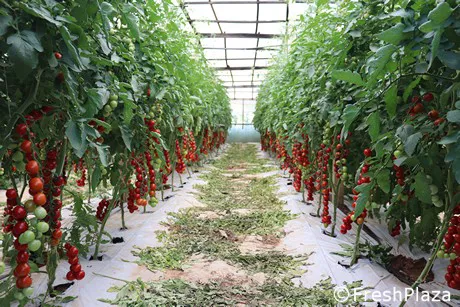Abbreviations such as CMV, TYLCV, ToMV, ToMMV, TSWV terrorise tomato growers nowadays, as they represent the acronyms of some of the viruses that damage both greenhouse and open-field crops. Growers spend most of their money trying to control the spreading of viruses. Hygiene measures, crop protection, insects - whatever is available. Italian growers believe things might change in the near future.

Nucleic Acids Research
Scientists from the Martin Luther University in Halle-Wittenberg (MLU, Institute of Biochemistry and Biotechnology), the Leibniz Institute of Plant Biochemistry (IPB, Department of Molecular Signal Processing) and from the Italian National Research Council (CNR, Institute for Sustainable Plant Protection) presented their discoveries on "Nucleic Acids Research, Oxford Academic".
One of the researchers illustrated to FreshPlaza the details of a new method that enables a quick identification and production of "RNA" vaccines effective against infectious agents. The research group showed that it is possible to strengthen the plants' natural defenses against viruses using RNA vaccines.
 CNR virologist Vitantonio Pantaleo (in the photo) reveals that "during an infection, plant cells act as a multiplication tank of the virus genome, i.e. of the invader. Yet plants maintain the capability of detecting said invaders. Special enzyme scissors cut foreign viral molecules. This process produces a multitude of viral interfering RNAs (vsiRNA) which spreads within the plant and associate with proteins of the Argonautes group (AGO). VsiRNA guide AGOs in a sequence-specific manner against the viral genome mediating degradation and deactivation."
CNR virologist Vitantonio Pantaleo (in the photo) reveals that "during an infection, plant cells act as a multiplication tank of the virus genome, i.e. of the invader. Yet plants maintain the capability of detecting said invaders. Special enzyme scissors cut foreign viral molecules. This process produces a multitude of viral interfering RNAs (vsiRNA) which spreads within the plant and associate with proteins of the Argonautes group (AGO). VsiRNA guide AGOs in a sequence-specific manner against the viral genome mediating degradation and deactivation."
"The virus-silencing mechanism is not always very effective in nature, as some vsiRNAs are truly very effective. Scientists have therefore developed a screening process based on vegetable cell extracts that enables the identification of the most efficient and effective vsiRNAs, called "efficient antiviral siRNAs (easiRNAs)".
Virus on tomatoes
MLU biochemist Sven Berhens stated that "selected easiRNAs have a better affinity with the AGOs. In addition, they can recognize the weaknesses of the viral genome better than the others. The effectiveness of easiRNAs was demonstrated vaccinating tobacco plants (Nicotiana benthamiana) infected by a model virus, the Tomato bushy stunt virus (TBSV). The result was surprising: after six weeks, 90% of vaccinated plants showed no sign of infection, while all those untreated were killed by the virus."
"If the virus changes, the screening method enables the quick identification of the suitable RNA molecules to fight the new invader. This means we can be very flexible when fighting the new parasites."
A patent application for the method has already been filed.
Vaccinating potential
"RNAs are natural molecules found in nature. Tomatoes that get to our tables fresh or preserved already contain such RNAs. If we consider that using RNA vaccines is potentially effective to control pathogen fungi and post-harvest harmful agents, we can see all of its great potential," added Pantaleo.
The research group will now continue to explore and improve the screening method to clarify the application method and persistence on treated plants. Further studies will demonstrate how larger quantities can be produced at sustainable costs. Plant absorbance modes and efficiency will also be studied.
"According to Behrens, these studies can help reduce the use of chemicals in agriculture to the benefit of the environment, consumers, producers and the entire food chain in compliance with the objectives of the UN Global Agenda for Sustainable Development."
The research was financed by the Deutsche Forschungsgemeinschaft (DFG, German research foundation) within the Center of Collaborative Research 648 and the State of Sassonia-Anhalt Priority Research Programme. The OECD also contributed to financing the researchers.
Source: Gago-Zachert S. et al. Highly efficacious antiviral protection of plants by small interfering RNAs identified in vitro. Nucleic Acids Research (2019). doi: 10.1093 / nar / gkz678.
Contacts:
Vitantonio Pantaleo PhD
Plant Virology Labs .
Institute for Sustainable Plant Protection
National Research Council
Via Amendola 165/a
70126 Bari, ITALY. c/o UNIBA Campus
Tel.: +39 080 544 2935
Email: vitantonio.pantaleo@cnr.it
